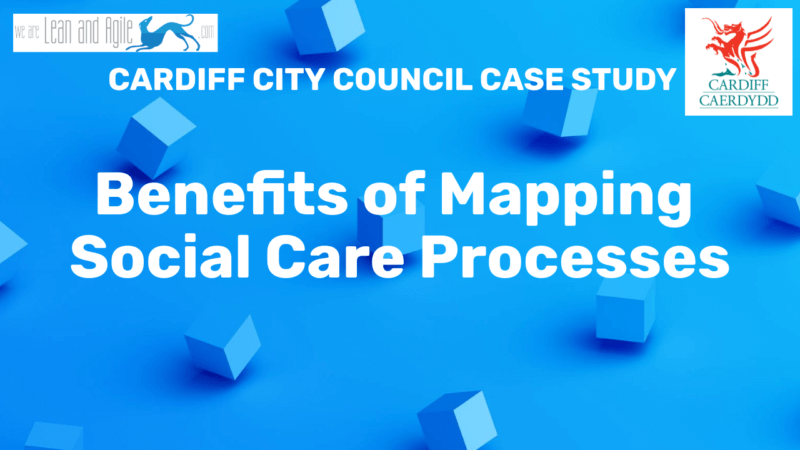Mapping social care processes – Cardiff Council case study

In October 2021, Andy Sandford from We are Lean and Agile spoke with Jacob Choudry-Ball from Cardiff Council to discuss how process mapping can be applied and utilised to improve social care processes. This blog is a summary of that conversation, which was done live on LinkedIn and can be viewed below.
The Project
Jacob Choudry-Ball was a Senior Business Analyst at the time of this work, and has now moved onto a new role as a Performance and Insight manager in the central performance team.
During the 12-week project, the team set out to understand the many social care processes Cardiff Council has. Cardiff had used Visio as their process mapping tool for previous projects, but a better solution was needed for these complex processes.
To accomplish this, the team reached out to Andy at We are Lean and Agile to start a trial of the Engage Process Modeler. The trial provides the full functionality of the Engage Process Suite for up to a month, acting as a proof of concept to prove that the solution will provide tangible benefits for the organisation. Cardiff picked the Engage Process Modeler as it provides many benefits over Visio. The main benefit being the rich data and data analysis built into the software, allowing for process maps to be the one place of information about a process. The in-built analysis also provides times and costs for a process, and the ability to compare this data against one or many To-Be maps so that the team can make the best decision.
The tool is quick to pick up and use, you can be workshop ready after only a 90-minute training session or e-learning at your own pace. For this project the Business Analysts at Cardiff were trained to use the process mapping software, which was then used in facilitated workshops with the service area. The priority of these facilitated workshops was based on outstanding problem or concern was raised.
The project used in-person workshops (done before Covid-19) with Engage on a large display. The mapping was done by a two-person team, one business analyst facilitating the discussion and another mapping the process into Engage. Most processes were completed in two stages, initially the structure and path of the process was built, with the metadata such as roles and timings of steps, and the validation of the map being completed in a second session.
As Cardiff Council had previously used Visio, some of the initial structure of the processes could be transferred into Engage. However, Visio does not record the rich data that Engage enables so this had to be added in a workshop. The rest of the process maps which did not originally have a Visio map were mapped directly into Engage.
Cardiff Council utilised the sharing functionality built into Engage to enable members of the workshop and the wider team to view and comment on the process map in between sessions. This was primarily used between the first outlining workshop and the second data and validation workshop.
Outcomes of the project
One of the most important steps of a process redesign project that is often overlooked is to map the As-Is process. The mapping exercise will help to uncover where the process is going wrong and highlight where the inefficiency and time waste is. In this project, several key problems were uncovered.
The first was that although the social care teams had software to manage cases and payments, there was still several spreadsheets providing vital functions. This caused data inaccuracy, duplication and reduced the amount of people who could be working on a case at once. These spreadsheets were created as a quick way to add data collection functionality on top of the existing system where it couldn’t do so. However, these additional spreadsheets cause the time and efficiency of the processes to worsen. This led to another key issue that there was low speed and accuracy of payments, leading to negative feedback from customers.
To address these issues, the To-Be processes were designed to improve on these aspects, removing as many of the excel spreadsheets as possible and moving everything onto the existing system or a capable solution. Improvements and solutions to problems in the As-Is maps along with the time and cost comparisons were compiled into a high-level business case which was proposed to the service area for their decisions.
Overall, the project saved over £100,000, evidenced from the process maps using the comparison functionality and the results multiplier to calculate the cost and cost-saving between processes based on the yearly throughput.
The Engage Process Suite was vital to the success of this project, contact us today and we can discuss how it can benefit your organisation.
